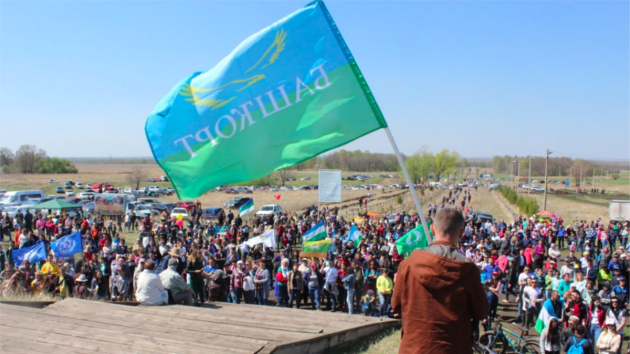A new wave of repression against national movements and activists in the republics of the Russian Federation is expected in Russia. Last Friday, the Supreme Court of Bashkortostan made the expected decision to recognize the Bashkir public organization “Bashkort” as extremist. The organization was found guilty of holding a protest rally during the campaign to exclude the languages of the titular nations from the republican education system, and then organizing protests against the industrial development of Mount Kushatau, which has historical significance for the Bashkirs.
It is worth noting that in the conditions of Putin’s Russia, the recognition of an organization as extremist can lead to criminal prosecution with real prison sentences for its members, potentially affecting thousands of supporters of that organization (with just one VKontakte group having about 60,000 participants). Considering that the leader of the Bashkir National Political Movement, Ayrat Dilmukhametov, has been behind bars for almost a year and will be tried by a military tribunal in Samara on May 27 on charges that carry a lengthy prison sentence, the real cleansing of the republic’s socio-political space is evident.
At the same time in Tatarstan it became known that a veteran of the Tatar national movement, a Tatar writer and a defender of the rights of Muslims, Fauzia Bairamova, was summoned to the prosecutor’s office in Nizhnekamsk. The deputy prosecutor informed her that her speech from a year ago on the Day of Remembrance for the Defenders of Kazan, in which she called on “the people to open their eyes to the great self-deception” because the Tatars were “losing their nation, identity and themselves” before the whole world, with a “colonial administration” ruling over them, was being investigated.
It is worth noting that Fauzia-Khanum had previously received a suspended sentence for similar statements, and her colleague Rafis Kashapov served several years in prison before leaving Russia to avoid a new sentence and seeking political asylum abroad.
But repression is not limited to Muslim regions. In the Republic of Komi, a similar investigation was launched against Nikolai Udoratkin, the leader of the organization “Doriam asnym” (“Protect Yourself”). This organization also took part in protests against the anti-grassroots policies of the authorities, raising issues of the protection of the republic as a whole and its indigenous peoples in particular.
The synchronicity of these repressions against the background of new plans to eliminate national districts (this time the Nenets Autonomous Okrug, which is to be merged with the Arkhangelsk Oblast) leaves no doubt that this is a new wave of chauvinist repression against indigenous peoples.

